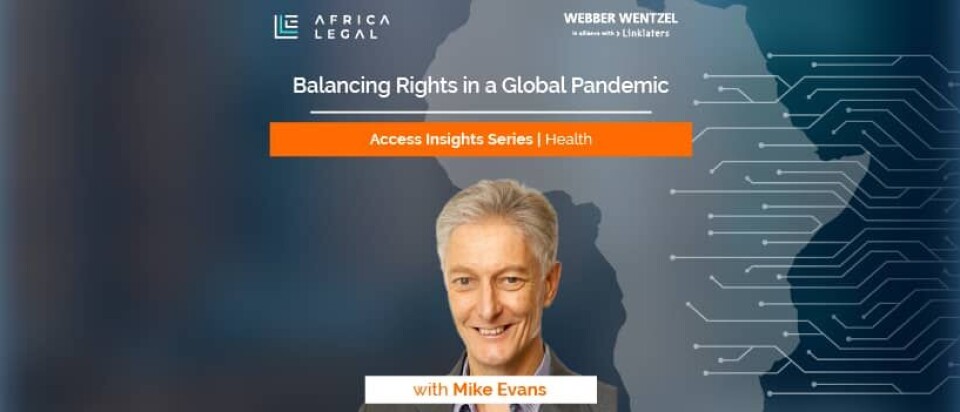The Covid-19 pandemic has led to several African nations introducing a variety of vaccine mandates which affect some individual rights and freedoms while aiming to protect public health, says Michael Evans, partner and former head of Public Law at Webber Wentzel.
“A number of countries have introduced either partially or fully mandatory vaccinations,” said Evans, citing a recent survey that Webber Wentzel conducted in collaboration with its alliance and key relationship firms across 16 African countries.
“Probably the strongest when I looked at these other countries and what they were doing was Mauritius, which is a very successful country from a business perspective,” he commented.
In Mauritius, vaccines or weekly negative PCR tests are mandatory for police and fire rescue officers, employees working in the health sector and visitors to health care facilities, as well as employees in educational or training institutions, residential care homes, airports and ports. Vaccine passes or negative PCR tests are also required before one can go to restaurants, hairdressers, beauty salons, cinemas and malls.
Vaccine mandates have also been introduced in some sectors (like healthcare and education) and large businesses in Morocco, Ghana, Namibia and South Africa. In other nations such as Tanzania, Uganda, Cote d’Ivoire and Botswana there are no vaccine mandates, but governments and companies have taken steps to make vaccination easier and better understood, and to strongly encourage citizens and employees to get vaccinated.
In the South African context, Evans noted that many companies including Discovery Health, MTN and Investec have now introduced mandatory vaccinations. Webber Wentzel has also introduced mandatory vaccinations for staff effective from 17 January 2022. Most of the big trade unions have supported workplace vaccine mandates, as has the statutory organisation NEDLAC which represents labour, government and business.
Despite widespread support in South Africa for workplace vaccine mandates, Evans believes the matter “will almost certainly end up in court”, with interest groups challenging mandates or business organisations looking for a declaratory order from the Constitutional Court.
“Those opposed to mandatory vaccines have been stressing individual rights, like the right to bodily and psychological integrity, the right to freedom of religion and belief, and the right to privacy,” Evans explained. However, he pointed out that the Occupational Health and Safety Act in South Africa specifically requires employers to protect their employees and take steps to avoid risks. Employers must balance such rights and obligations.
Given the widespread effect of the pandemic, the way it’s spread, and the availability and impact of vaccines, Evans believes it’s highly likely the Constitutional Court would rule in favour of protecting employees and customers even though such measures limit some individual rights. The health and safety legislation provides a law of general application needed to limit any constitutional rights.
“In a sense you’re even protecting the right to life, because if people contract Covid badly they are at risk of death,” he said. “You’re also protecting the health system because you’re wanting to limit the number of people in ICU and on ventilators. All the statistics worldwide show that hospitals are dominated by unvaccinated Covid patients.”
While Evans expects workplace vaccine mandates to survive any legal challenge in South Africa, he says that if the government wants to extend mandates to public places, like Mauritius has done, then new regulations will need to be introduced.
“I’d like to see government move more firmly and strongly,” he commented. “They’ll need to amend the Disaster Management Regulations to allow for mandatory vaccinations before people enter public places and public events. Hopefully they’ll start saying if you have a restaurant or a cinema you must have mandatory vaccinations; similarly, if you run a gym or a church you must have mandatory vaccinations. That’s the next step in the process which we will need if we are to develop the herd immunity necessary for the revival of our economy.”
To join Africa Legal's mailing list please click here

